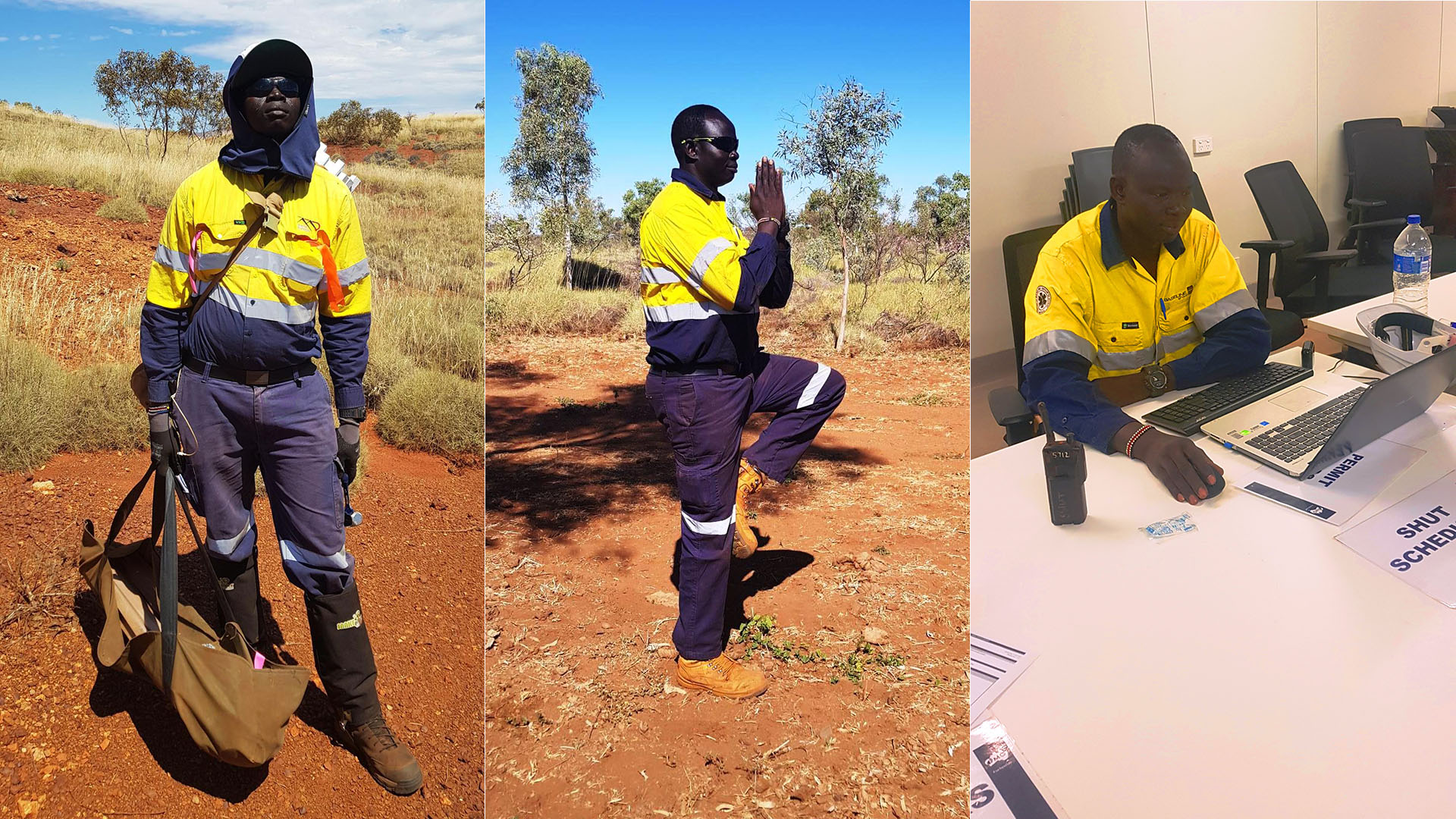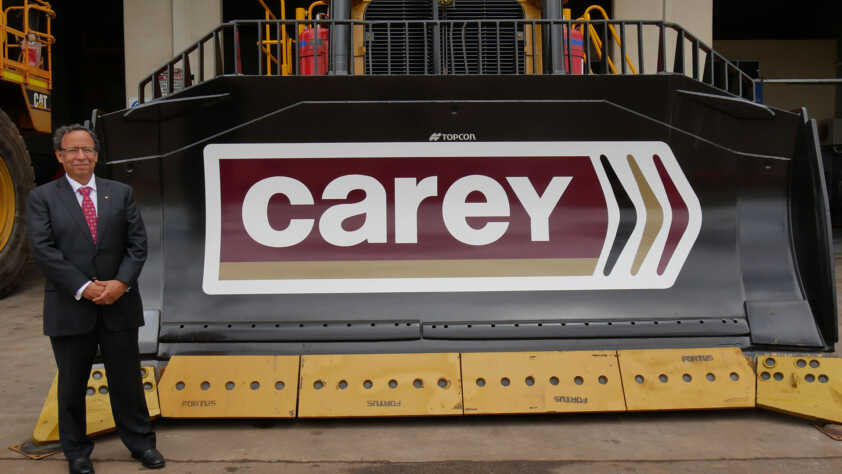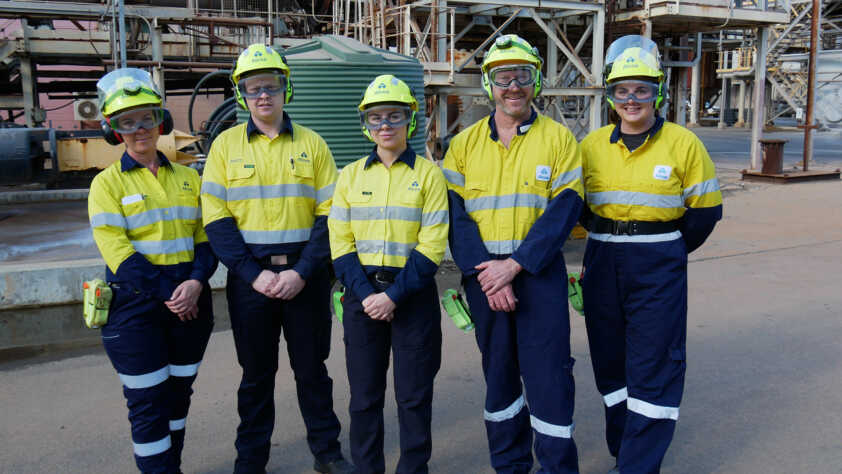Everybody’s life story has unique elements but it’s hard to imagine many others have travelled anything like the road that Philip Lako did to forge a career in the WA mining and resources sector.
Taken from his family at age 10 and forced to be a child soldier, Lako endured a decade of conflict in his home country of Sudan.
And when he did eventually escape that ordeal, he spent four years in a refugee camp before he was able to make his way to Australia.
“Imagine as a parent being asked to give one of your children away – that’s what happened to my parents,” Lako explains.
“They were asked to give one of their boys away [to the rebel Sudan People’s Liberation Army]. My father gave me away to protect my older brother, because he thought if they were to choose, they would probably take the older boy because he wouldn’t have to go through a lot of training and could go into the army straight away.
“But then that made me feel as if I had been disowned by my own parents. It was a very traumatic event.
“In the rebels, we didn’t have a lot of anything, and food was very, very minimal. We didn’t even know what breakfast was.
“We ate maybe every second day and most of the time we ate leaves and roots of plants. We didn’t have any sleeping materials and we used to use hessian bags to sleep on.
“How you went to bed and how you woke up was determined by the army. You might go to bed at 9pm and then around 3am they would storm in and start bashing people to wake them up.
“I knew people who literally died because they didn’t have blankets to shelter from the cold weather. And that went on for 10 years until I was able to escape to Kenya.”
Life as a refugee was more comfortable – but often only marginally.
“When you arrive at the border [of South Sudan and Kenya] you are classified as an asylum seeker. And once your refugee status is established, you get taken to a refugee camp,” Lako said.
“I ended up at Kakuma, quite a large refugee camp that had been established in 1992.
“Everything is really controlled. We used to get about 3kg of maize or flour, a spoon of salt and then maybe 300ml of oil. That was your ration for 14 days.
“And that was the moment I came to know about Australia. The wheat flour that we have here in Australia reached those refugee camps.”
‘What am I supposed to do with Vegemite?’
Lako may have escaped the rebel army, but refugee camps are frequently unpredictable, dangerous, and insecure environments.
With the assistance of the United Nations, he was eventually identified for resettlement in Australia and arrived here via Dubai in 2004.
“Growing up, after all this torture that I went through, I only had two dreams – one was to have a roof on my head so that whenever it rains it doesn’t leak on me, the other was to have a telephone,” he recalled.
“It became clear when I woke up in Australia that this was possible, because I looked up at the ceiling and couldn’t see any water damage.
“Mark Twain said the two most important moments in a person’s life were the day they were born and then the day they figured out why.
“The second part of that definitely became possible because of Australia and the network [of people] I’ve managed to have here.”
Even though Australia represented a welcome change from the life he’d lived for the previous 14 years in Africa, those early days weren’t without challenges.
“I had a very dramatic morning [the day after arriving in Australia],” Lako laughed.
“First of all, I had Vegemite in the [welcome] basket that was given to me and I could not understand that whatsoever. I thought it must have been a mistake as I’d been told that everything in the basket was edible.
“Then that same day I was also attacked by magpies.
“Catching the bus was an issue, even getting into a building with automatic doors was a challenge…I got frightened every time I walked into a building and the doors split in the middle.
“Those kinds of things caused me a bit of trauma but in an exciting way.”
Finding his feet in mining
Lako first gravitated towards working in mining for the same reason that many people do: the financial rewards could help him more quickly achieve important life goals.
Foremost among them was helping now-wife Lucia – the couple have gone on to have four children – to also emigrate to Australia.
Lako started out with a TAFE certificate in mining exploration and then followed that with a course in logistics. His first job was as a field assistant at Barick Gold’s Plutonic mine in the Murchison but he eventually found his way into the health and safety side of mining.
Currently, Lako is completing Bachelor’s degrees in Occupational Health and Safety, and Public Health Education and Promotion at Curtin University.
“I started to realise there was more to mining than just cutting core or sampling and then sending the samples to the lab,” he said.
“People urged me to get into safety because I had a good level of tolerance and got along with people quite well. I’m also very slow to anger and people can’t read my emotions, so that’s probably a good thing as well.
“Since I started working in the safety area, I’ve begun to realise that you can change people’s lives. You are coaching people and talking about life issues, such as mental health.
“In 2019 more than 3000 people [across Australia] took their own life and that’s just scary. We also know that for each person that takes their life, 135 people are impacted by that.
“I really do my best to get people to appreciate the reason why they are working. The money is one aspect but there is more to it.”

These days Lako works as a safety advisor for Gold Fields at the company’s Gruyere joint venture in the north-eastern Goldfields.
“Every single person within the business is empowered to be part of the safety journey,” Lako said.
An opportunity for everyone?
While keen to stress that he speaks from his own viewpoint and not that of his employer, Lako is hopeful there can be more opportunities for other refugees to follow in his footsteps and find a niche in the WA mining and resource sector.
Two current barriers he sees are that refugees usually arrive without the same networks of contacts that longer-term Australian residents have, and that language challenges can often put them on the back foot to start with.
“I know people who have studied here and have master’s in environmental studies but are working as cleaners or in chicken factories,” he explained.
He also believes there is a compelling case for refugees to be settled in regional towns where they might better adapt to the environment and more easily find their way into local industries that have been challenged by skills shortages.
Lako is an advocate for the Goldfields Migrant Employment Program, a State Government-funded initiative administered by the Goldfields Community Legal Centre, which aims to attract Perth-based migrants to WA mining heartland and connect them with job opportunities.
“People that live in Kalgoorlie, they don’t think of going anywhere else,” Lako said.
“Imagine if you could introduce people [to that] early on. If people come from a refugee camp and you bring them into the city [Perth], that’s probably not going to work very well.
“I think we should market these towns, as an industry working closely with government, to see if they can take refugees when they first arrive in Australia.
“I know there would be some concerns about services that are available but a town like Kalgoorlie it should be all right.
“I remember talking to one of my colleagues that I know who has migrated from Africa and she was saying the only time she feels peaceful is when she sees a lake and massive trees [around it]. That environment is something we can find in the countryside.”
Lako, who is active in the Rotary Club of Perth, also wonders whether mining can potentially offer hope for Australians who are doing it tough.
“I can remember meeting a young man in the city, who was homeless at 36 and a qualified accountant,” Lako said.
“I sat with him, and he told me that he messed up in life but all he wanted to do from this point was to get up again and contribute to the rebuilding of the nation.
“I wonder if there’s something the industry could possibly do to support these people, who are really wanting to improve their lives.
“We have nearly 10,000 people homeless in Western Australia and that’s only the ones that are known.”

What about Africa?
While Lako has established a new life and career on this side of the Indian Ocean, he still maintains a strong connection with his homeland.
While his mother passed away in 2018, his father, brother and two sisters remain in South Sudan, and he has returned to visit them. Sadly, another sister died in 2010.
“The reason she died was because we didn’t have any maternity ward in the town,” he said.
“One day I would want to build a maternity ward there so that women would not die simply because there are no maternity wards. Those things do affect me dearly.”
Because of his own experiences and the opportunities, he has been able to grasp, Lako is very much an advocate for what Australia and its highly developed industries can offer.
But he also knows that skilled migration can be a double-edged sword. For each skilled person that chooses to move to Australia, there is one less in their country of origin.
Lako hopes that Australian mining companies might consider investing in skills and training development programs in Africa, not just to prepare workers who might one day want to come here but to bolster local workforces in the long term.
“If we’re taking skilled people from South Sudan, which is still developing, you can see how that country might never improve,” he said.
“If we’re taking the engineers and the doctors how is that country supposed to develop?
“If you look at what Zimbabwe did in the 1980s, before independence…if you go into a workshop today and see an African person working as a fitter, and you guess that person is from Zimbabwe – there’s a 99 per cent chance you are right.
“The systems they had there and the apprenticeships they offered created a lot of opportunities. Even today it’s still successful.
“Some people have now left Zimbabwe because of the economic issues [over the past 20 years] but initially there wasn’t much exportation of skills out of the country.”
Philip Lako, published author
Lako first began writing the extraordinary story of his life in 2009 but it was a challenging process and he put it on the backburner until a few years ago.
Even when he started again, it brought back trauma from his childhood that he wasn’t sure he was ready to relive.
“A few times I broke down and cried because of the fact everything was coming back and it was quite emotional,” he said.
“At the same time, it was healing as well. One of the reasons why I wrote the book is because I believe there a lot of migrants who have gone through what I went through and that sharing that story is going to enlighten some mainstream community members to appreciate the importance of sharing stories.
“The best way, as a manager or someone running an organisation, that you can get the best out of your people is by getting to know their personal stories. I think that’s quite powerful.”
Lako’s autobiography, The 10-year-old Man: Unwavering Resilience to Self-Restoration is now available to buy on Amazon.
In keeping with his life story, getting the book to print was no easy task. Had it not been for meeting a fellow author through Rotary in 2018, he would likely never have linked up with UK-based Shelagh Aitken, who became the book’s editor.
Finding a publisher likewise proved a challenge, with Canada-based Tellwell eventually coming on board. Lako is also grateful for a connection to Perth’s Scotts Print, which enabled him to print several copies locally.
Ten per cent of proceeds from book sales will be donated to Rotary International to support humanitarian programs.

The difference Australia has made
For Lako, the opportunities available to him in Australia have been life changing.
He’s found a career he didn’t know was possible and been able to tell his story in a way that he hopes can influence others. He’s also met people who he would never otherwise have had the chance to encounter.
“I have a friend in Albany, who is Caucasian and was born in Australia,” Lako said.
“But I’ve gotten to the point where I see this person as a brother to me, like a real blood-brother. He’s family.
“Mining has given me the opportunity to meet some incredible people. My book was only possible because of the fact I work in mining and had people encourage me and say, ‘you really need to write this book, your life is really important’.”
Of course, there’s a fairly substantial fork in the road from much earlier in life that Lako also has to ponder.
What if he’d never escaped his stint in the rebel army?
The best-case scenario, he feels, is that he might have survived until the 2005 Comprehensive Peace Agreement that led South Sudan towards its 2011 independence and gone back to village life – perhaps working in a cattle camp, farming, or fishing.
But the alternative is far more frightening.
“I think I would possibly have died,” Lako reflects.
“I escaped from an active military training camp. My cousin didn’t survive.
“There was a very high chance, that would have happened to me [had I not escaped].”






